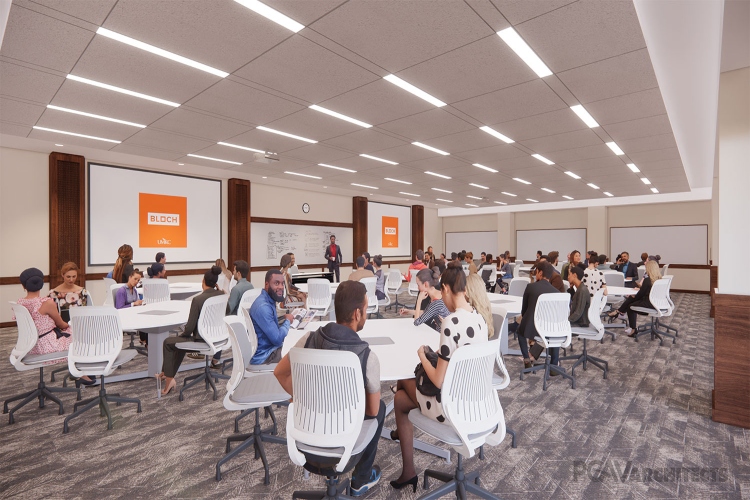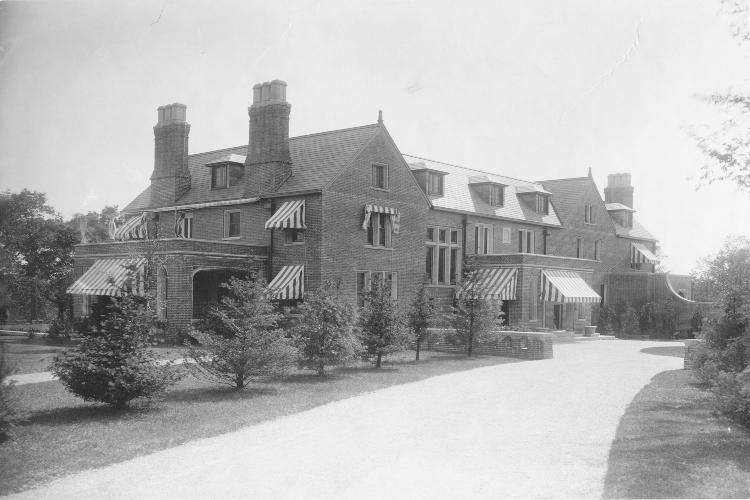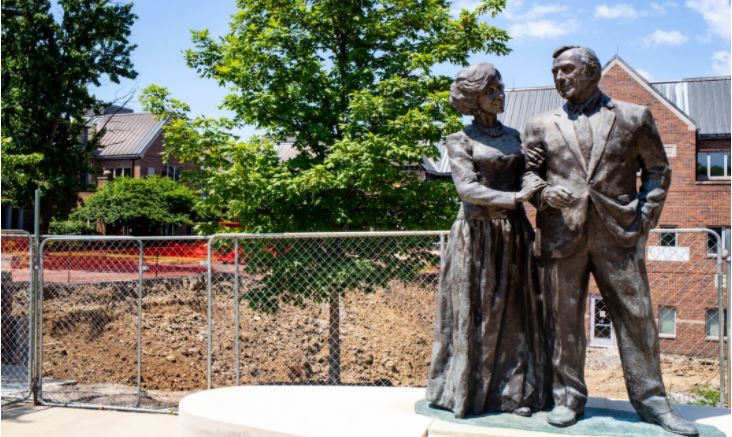The renovation of Bloch Heritage Hall moves a thriving business school into the future
When completed, the renovation of Bloch Heritage Hall will be more than new carpet and reconfigured classrooms.
It will be even more than eye-popping technology, although the reimagined facility that has anchored the Bloch School since its earliest days also will get that.
The $15.2 million renovation, expected to welcome students by the Fall 2022 semester, is really about fulfilling its namesake’s unwavering vision of excellence for the school. For more than three decades, Henry W. Bloch, who died in 2019, faithfully invested in the business school with his time and money because he believed that having a top business school in Kansas City was key to the city’s success.
“The Bloch School was Henry’s pride and joy,” said David Miles, president of the Marion and Henry Bloch Family Foundation, a lead funder of the renovation project. “In a city this size, with the number of businesses and entrepreneurs we have, he believed there had to be an outlet and a location for you to receive high quality business knowledge and also a place where professionals could network and connect.”
The Bloch Foundation’s $8 million contribution to the Bloch Heritage Hall renovation project was already well in the works before Bloch died. Miles said Bloch saw the potential of this renovation project to propel the Bloch School to new heights.
“Henry was excited about this project,” Miles said.
The Sunderland foundation joined the Bloch Family Foundation as a lead donor for the Heritage Hall renovation project. In addition, six-figure gifts were received from the William T. Kemper Foundation, Mike Plunkett, Nathaniel Hagedorn, Jim Stowers and the Capitol Federal Foundation. The project also had generous support from well over a dozen alumni, community members and friends of the school, said Jay Wilson of the UMKC Foundation.
Kent Sunderland, chairman of the Sunderland Foundation and chair of the UMKC Foundation, said their gift was motivated in large part by respect for Henry Bloch and the Bloch family.
But Sunderland noted the gift also was predicated on his shared belief in the project’s potential to improve the business school. That in turn will help UMKC and Kansas City, he said. “That’s what we want UMKC to be,” Sunderland said, “A place people can go and (then) apply their talents to businesses here in Kansas City.”
For Brian Klaas, Bloch School dean, the link between the renovation of Bloch Heritage Hall and that aspiration is just as clear. The project will give the Bloch School the infrastructure it needs to better support students, improve student retention and recruit more students to meet enrollment goals.
“It’s really driven by a desire to fundamentally alter the student experience,” Klaas said.

The Project
Bloch Heritage Hall is an amalgamation of the historic Shields Mansion, an estate built in the early years of the 20th century for grain magnate Edwin W. Shields, and a sprawling addition the university completed in 1986 with a $1 million contribution from Henry Bloch. The building, with its plentiful classrooms and offices, served as the school’s primary home until 2013 when the business school expanded its footprint to include Bloch Executive Hall for Entrepreneurship and Innovation.
While Bloch Heritage Hall has continued to serve as an important piece of the Bloch School’s infrastructure, the building has not always kept up with the changing nature of education. In addition to needing better technology and differently arranged classrooms, the building’s largest deficit had become its lack of a central common entrance or student gathering area.
“If a parent walked in the front door and wanted to talk to someone about the school, there’s no one to talk to. No place to go,” said Miles.
Similarly, students had to walk through a maze of hallways to find various student service offices. Nothing was centralized or clear.
The renovated Bloch Heritage Hall will change all that by creating a main entrance off Cherry Street, which will feature a new student services hub. All of those previously hard-to-find student resources, including undergraduate advising, the career center, recruiting, tutoring, and student clubs, will reside there.
In the design created by PGAV Architects, square footage for the hub will be created by filling in two floors of an atrium — the centerpiece of the 1986 addition. On the first floor immediately below that hub, newly created floor space will be dedicated to an open common area where students can mingle and meet. The idea, said Klaas, is to help students connect with school resources and their classmates so they stay in school, graduate, and move into successful careers.
“What we’ve learned is that students need a sense of connection, and they need prompts and nudges,” he said. “We want to create an energy and a sense that this is where great things are happening.”
Demand for Flexibility
Another major goal of the renovation is to make the learning environment as flexible as students demand. This includes equipping classrooms with technology to make logging into class remotely effectively the same as attending in person.
As part of the “RooFlex” learning experience, video screens and cameras will be installed in the front and back of many classrooms so professors can see virtual students just as they see in-person students, and students can glimpse all their classmates, either in person or online. One classroom will include a wall of monitors, so professors can simultaneously see every student gathered remotely as if they are seated before them.
While COVID-19 accelerated the need for virtual learning, the demand was already there among many students, said Sidne Ward, associate dean of the Bloch School who serves as the school’s liaison on the renovation project. She expects it will only increase once the pandemic fades away.
“Our students are working full time. They might be traveling,” Ward said. “They might be in the classroom sometimes, but there might be a time when they’re sitting in Chicago in a hotel room.”
Other students are juggling children with work and school and having the option to take classes remotely — at least part of the time — may be the only way they can pursue a business degree. The renovated classrooms will give students the ability to have as much remote learning as they need, while still providing a top-notch campus environment.
The improvements will put Bloch ahead of many business schools around the country.
“Some very impressive schools are making these kinds of investments, but it’s not commonplace,” Klaas said.
Ultimately, he hopes the changes in the learning environment the renovation will give the Bloch School the ability to attract more students and meet its goal to double in size by 2029. Over the last three years, enrollment has grown by 15 percent to include about 2,000 undergraduate and graduate students.

A Linked School
In addition to improving technology to enable better virtual learning, the expanded Bloch Heritage Hall will get redesigned classroom spaces, including additional small rooms where students can gather to meet on projects, and some additional larger classroom spaces, which have been in short supply at the school. One of those larger classrooms will be added underground and include a corridor to physically link Bloch Heritage Hall to its neighbor, Bloch Executive Hall.
Boosters of the project promise that the two buildings will be linked in more ways than just a corridor, however. The Heritage Hall makeover will maintain design elements that respect the architectural style of the century-old Shields Mansion. But the completed project will also infuse Heritage Hall with the 21st century sophistication that Executive Hall is known for.
When supporters and dignitaries gather to cut the ribbon and ceremonially open the new building on July 30, 2022, the anniversary of Henry Bloch’s 100th birthday, Klaas is confident that the completed project will achieve one of the Bloch School’s ongoing aspirations. The newly linked, modern campus will be something that Henry Bloch would be proud of.
“Henry was about the Bloch School supporting the needs of Kansas City,” said Klaas. “He was about the Bloch School helping Kansas City be prosperous, healthy and strong. What this building is going to do is help us provide better educational opportunities to more students. That in turn is going to support employers, making them more successful by building the talent pool in Kansas City.”

